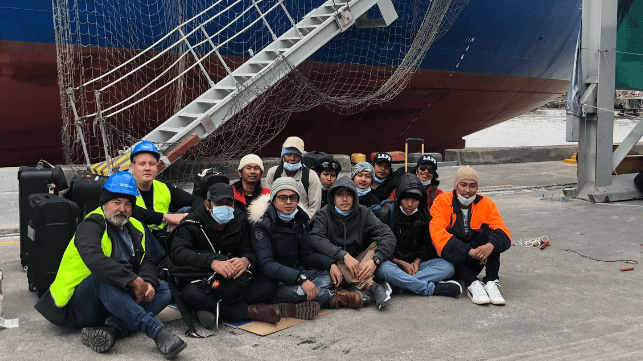You are here
On Human Rights Day, HRAS Calls for Transparency on Seafarer Abuses
On Human Rights Day, HRAS Calls for Transparency on Seafarer Abuses
Dec 10, 2021 https://www.maritime-executive.com/article/on-human-rights-day-hras-call...
MUA-ITF representatives with seafarers who had been stranded on board during the crew change crisis (MUA-ITF)
On World Human Rights Day, Human Rights at Sea published an independent review chronicling the ongoing humanitarian crisis at sea and the continued violation of seafarers’ human and labor rights.
Drawing from 40 publicly accessible reports, articles and documents, this publication recounts the threats to seafarers’ rights during the COVID-19 pandemic and highlights 10 areas of abuse.
In particular, the "crew change crisis" saw around 400,000 seafarers stranded on their vessels at its peak in 2020. However, long-term underreporting of abuses in the maritime industry - combined with often ineffective application of existing legislation - has created a systemic threat to the adequate protection of seafarers’ rights. This extends beyond the distresses witnessed during the early stages of the pandemic.
According to HRAS, the seafarers' rights issues that came to public attention during the pandemic were not caused by COVID-19 disruption. They had already existed for many years, left to grow unchecked thanks to "ineffective application of legislation and existing maritime industry governance, including the structure and exerted influence by flag state authorities within UN agencies."
In its report, Human Rights at Sea make three key recommendations to better protect seafarers and their families: increased public transparency of cases, better media profiling, and the exposure of known abusers for increased deterrent effect.
“As supply chains keep moving, the stamping on seafarers’ fundamental rights quietly continues unabated as evidenced through international reporting. What is occurring behind the scenes can only be extrapolated from the limited cases which make it to the public’s awareness, compounded by a top-down unwillingness and IMO policy not to expose abusers for an embedded fear of tainting reputations and upsetting states,” said David Hammond, CEO of HRAS.


